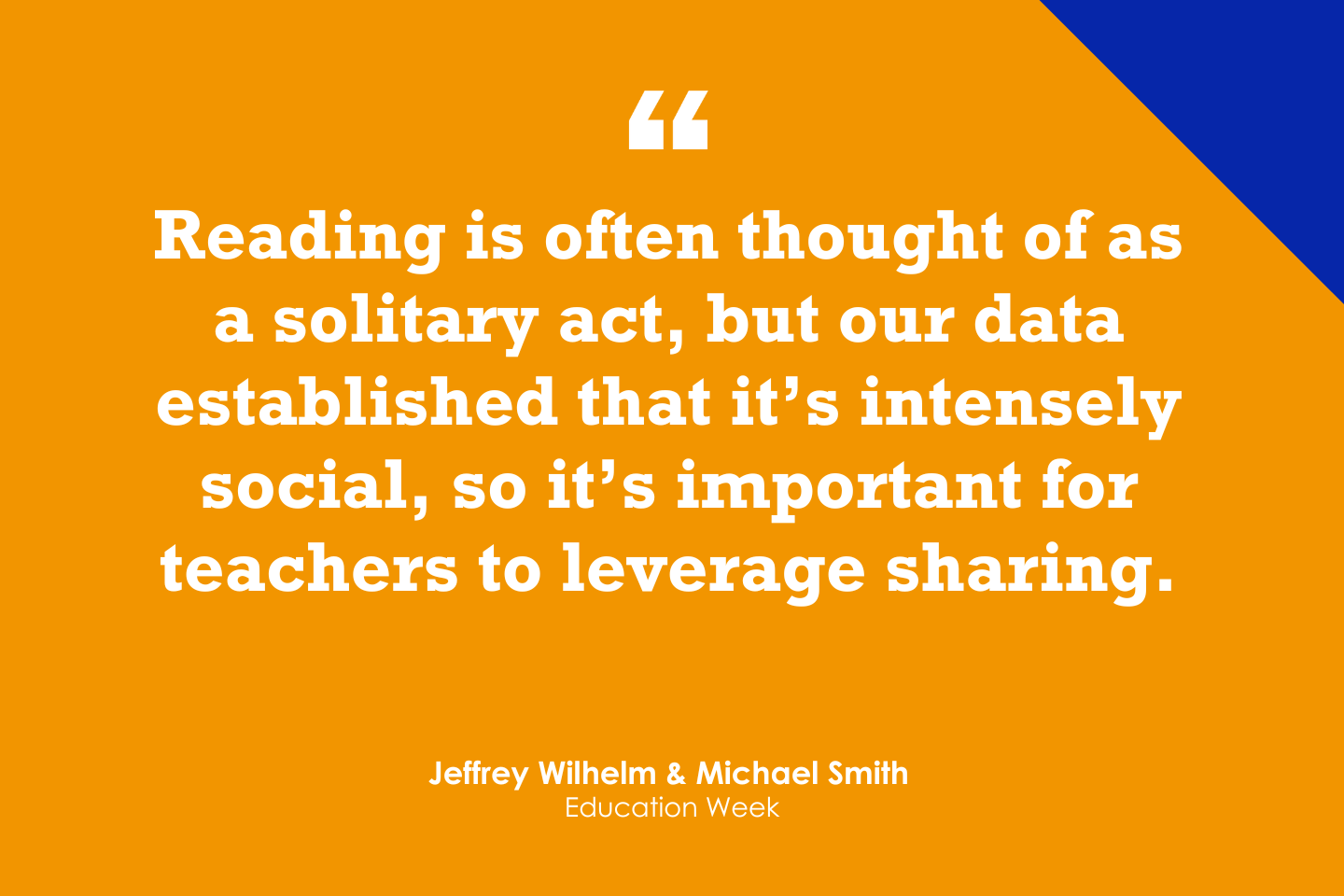
As regular readers know, I’ve been doing the Classroom Q&A column over at Education Week for thirteen years.
And I plan to continue doing it for quite a few more years.
I have so many contributors now, though, that there really isn’t space there for my annual thematic compilation posts, where I collect links to all the posts on particular topics.
So, I’m starting to do it here instead:
Today’s theme is on Reading Instruction:
Readers Can Struggle at Any Age. Here’s How Teachers Can Help
Struggling readers may be able to read the words but fail to make the necessary connections between ideas and their meaning.
How to Expand Teens’ Vocabulary
Students are unlikely to expand their vocabulary by copying definitions of words. There are other, better ways.
Students Need to Make Sense of What They Read. Here Are Ways to Support Them
To promote verbal reasoning, teachers can offer opportunities for students to ponder language, then explain and justify their thinking.
4 Educators Share Their Favorite Reading Lessons
Key to all these lessons is teachers’ effective use of instructional time through student engagement.
Teachers Can Support Struggling Readers in Middle and High School. Here’s How
Older students’ literacy challenges can be overlooked. But there are instructional practices that will foster reading growth.
Reading Research Is Getting Lost in Translation. What You Need to Know
There’s a yawning gap between what experts know will work and how that’s implemented in the classroom.
Teachers, You Don’t Need to Choose Sides in the Reading Wars
Instead of arguing over who’s right, let’s focus attention on expanding knowledge about unresolved instructional issues.
Many Older Students Are Struggling to Read. How Can Teachers Help?
Educators offer targeted instructional steps to support middle and high schoolers in their journey to understand the written word.
Use Knowledge-Building Curriculum to Boost Literacy
How Can a Teacher Navigate the So-Called ‘Reading Wars’?
* High-Interest Books & Giving Students Time to Read & Talk About Them in School
Three teachers offer their recommendations of high-interest books for students to read, including for English-learners.
* Students Like Books ‘That Help Them Feel Seen, Heard, & Valued’
Four educators share theirmdash;and their students’mdash;favorite books, including song picture books and ones focusing on SEL skills, as well as emphasizing the importance of ones that represent “a wide range of experiences.”
* Representation Matters in Classroom Libraries
Four teachers discuss specific titles, and common elements, in books that students find popular, including the importance of being able to see themselves in the characters.
* Reading & Writing Instruction in the Age of the Coronavirus
Keep it simple, keep it flexible, and keep the routine familiar are among the suggestions three educators give in assigning students work while distance learning.
* Connecting Reading & Writing ‘Is a High-Leverage Move’
Five educators recommend strategies for using reading instruction as a tool to improve students’ writing skills, including through the use of informal writing and sections of reading texts students can use as models for their writing.
* Ways Reading Can Support Writing Instruction
Five educators share ideas on how reading instruction can help students become more effective writers, including through the use of mentor texts and through a guided step-by-step process.
* ‘Writing Helps Grow Readers’
Assigning students to write about what they are reading and asking them to compose in various formats are among the tips seven educators offer in their discussion of the role of writing in reading instruction.
* ‘Writing Directly Benefits Students’ Reading Skills’
Five experienced educators discuss how writing instruction can support the development of reading skills for students throughout K-12 and provide tips for doing that important work.
* Ways to Strengthen Students’ Information-Literacy Skills
A series on teaching information literacy to students finishes up with suggestions from Elliott Rebhun, Dr. Laura Greenstein, Michael Fisher, Dr. Barbara R. Blackburn, and Douglas Reeves.
* ‘We Need to Teach Our Students to Be Smart Consumers of Information’
Carla Truttman, Josh Perlman, Jennifer Casa-Todd, Bryan Goodwin, and Frank W. Baker share their suggestions for information-literacy lessons.
* Reading Logs Should Be Tools for ‘Students to Spy on Themselves’
* Jennifer Serravallo, Stephanie Affinito, and Amanda Koonlaba wrap up this four-part series by suggesting that students be treated as real readers rather than being assigned “reading logs.”
Tan Huynh, Rich Czyz, Christine Tennyson, Mara Lee Grayson, and Diane Mora write about what they prefer to use to encourage student reading rather than “reading logs.”
* Pros & Cons of ‘Reading Logs’
Laura Robb, Melissa Miles, Ryan Huels, and Rinard Pugh share their thoughts on finding ways to help instill love of reading in students and keep abreast of their progress.
* ‘Reading Logs’ Can ‘Kill Students’ Love of Reading’
Mary Beth Nicklaus, Beth Jarzabek, Jennifer Casa-Todd, Jennifer Orr, and Leah Wilson contribute their thoughts on the use or nonuse of reading logs to document student reading at home.
* Phonics Instruction Doesn’t Have to Be ‘Boring & Dull’
Casey Schultz, Mandy Ellis, Dr. Carolyn Brown, Dr. Jerry Zimmermann, Kelly Wickham Hurst, and the late Dr. Kay MacPhee, who contributed a response prior to her death, discuss the role of phonics in reading instruction.
* Teach Reading Strategies ‘Little & Often’
A three-part series on using reading strategies wraps up with commentaries from Alex Quigley, Dr. Rebecca Alber, and Khristina Goady.
* Knowing ‘When to Stop Teaching Strategies and Just Let Students Read’
Bonnie Houck, Ed.D., Christine Tennyson, Jules Csillag, and Kelly Wickham Hurst share their thoughts on using reading strategies in the classroom.
* Using Reading Strategies Effectively in Literacy Instruction
Colleen Cruz, Ross Cooper, Lindsey Moses, and Elaine Miles discuss the role of reading strategies in literacy instruction.
* We Need to Create ‘Joyful Moments’ in Reading Instruction
Diana Laufenberg, Pernille Ripp, Valentina Gonzalez, Jeff Wilhelm, Barbara A. Marinak, and Linda B. Gambrell share their thoughts on mistakes to avoid when providing reading instruction.
* Mistakes Teachers Make in Reading Instruction
Regie Routman, Cindi Rigsbee, Dr. Rebecca Alber, Shaeley Santiago, and Wiley Blevins write about their suggestions for improving reading instruction.
* ‘There Is Not One Right Answer’ for Reading Instruction
Gravity Goldberg, Renee Houser, Tan Huynh, Samantha Cleaver, Jeffrey D. Wilhelm (with his second contribution to this series), Emily Geltz, and Sarah Shanks contribute answers to the question: “What mistakes do teachers make in reading instruction?”
* We Need to Let Students ‘Read, Read, Read’
Rita Platt, Sonja Cherry-Paul, Dana Johansen, Dr. Mary Howard, Bonnie Houck, Ed.D., Sandi Novak, Emily Phillips Galloway, Paola Uccelli, and Julie Swinehart wrap up a four-part series on reading instruction. I have also included comments from many readers.
* ‘Children Need Both Paper Books & Digital Texts’
Katie Keier, Stacy Nockowitz, Barbara Paciotti, and many readers share their thoughts on the debate between reading digitally or on paper.
* Reading Digitally vs. Reading Paper
Daniel Willingham, Kristin Ziemke, Lester Laminack, and Kimberly Carraway explore the topic of reading digitally compared with reading on paper in this post.
* Close Reading Can Be ‘Fun or Awful’
Christopher Lehman, Cris Tovani, Pernille Ripp, Jan Burkins, and Kim Yaris contribute their thoughts.
* Close Reading Is a ‘Life Skill’
Sonja Cherry-Paul, Dana Johansen, Stephanie Harvey, Julie Goldman, Diana Sisson, and Betsy Sisson are the featured guests in this post.
Kimberly Carraway, Katherine S. McKnight, Harvey F. Silver, Amy Benjamin, Nancy Boyles, and Rita Platt—along with readers—share their ideas.* Teaching Literature Through ‘Choice’ & ‘Practice’
This post features responses from Regie Routman, Katherine S. McKnight, and Michael W. Smith.
* Literature Can Be a ‘Gateway for Understanding Everything’
Several educators—Nancy Steineke, Sean McComb, Nancy Frey, Doug Fisher, Bill Himmele, and Pérsida Himmele—provide responses here.
* A Good Reading Lesson Doesn’t ‘Put Standards Before Students’
In this post, guest responses come from educators Cheryl B. Dobbertin, Ilse O’Brien, Katherine S. McKnight, and Regie Routman.
* ‘Reading Is Intensely Social’: An Interview With Jeffrey Wilhelm & Michael Smith
Educators Jeffrey Wilhelm and Michael Smith are co-authors of the new book, Reading Unbound.
* Ways to Engage Students in Reading
Jason Flom shares his ideas, as do many readers. I also add an intriguing chart.
* Reading Is a ‘Means to Bigger and Better Things’
Educators Kristi Mraz, Marjorie Martinelli, Kathy Barclay, and Cindi Rigsbee contribute their thoughts.
* Ways to Develop Lifelong Readers
Donalyn Miller, Mark Barnes, and Christopher Lehman contribute their responses.
* Using the ‘Fun Factor’ to Encourage Student Reading at Home
Read educator/author Nancy Steineke’s ideas, as well as comments from many readers.
* Getting Students to Read at Home by ‘Building a Daily Habit’
Dina Strasser and Ariel Sacks share their thoughts in this post.
* Helping Students Develop a Desire to Read at Home
In addition to sharing my own response, you’ll find contributions from two other guests—educators Donalyn Miller and Myron Dueck.
* ‘Teachers Know a Lot About Scaffolding’ for Complex Texts
This post includes three joint commentaries from Nancy Frey and Douglas Fisher, Tammy Mulligan and Clare Landrigan, and Aaron Brock and Jody Passanisi.
* Teaching Complex Texts Requires ‘Getting to Know Your Students’
Read responses from three educators: Wendi Pillars, Amy Benjamin, and Christopher Lehman.
* ‘Ten Elements of Effective Instruction’
This post includes pieces from Jim Burke and David B. Cohen, as well as comments from readers.
* Many Ways to Help Students Develop Academic Vocabulary
Several educator/authors—Marilee Sprenger; Jane Hill and Kirsten Miller; and Maria Gonzalez—provide guest responses.
* Ways to Help Our Students Become Better Readers
Stephen Krashen and Richard Allington share their ideas on helping students develop a love for reading.
* More Ways to Help Our Students Become Better Readers—Choice & Access
Teacher/authors Regie Routman, Laura Robb, and Kylene Beers contribute their thoughts in this installment of the reading series.
* Ways to Help Our Students Become Better Readers—Part Two
Nancie Atwell and Cris Tovani sent in their responses for this post.
* Ways to Help Our Students Become Better Readers—Part Four
This post featured recommendations from Kelly Young (my mentor), Douglas Fisher, Nancy Frey, and Carol Jago.
* Advice From the ‘Book Whisperer,’ Ed Week Readers, & Me About Teaching Reading
Donalyn Miller, the “Book Whisperer,” my colleague Dana Dusbiber, and several readers contributed here. I shared my own suggestions, too.
As regular readers know, I’ve been doing the Classroom Q&A column over at Education Week for thirteen years. And I plan to continue doing it for quite a few more years. I have so many contributors now, though, that there really isn’t space there for my annual thematic compilation posts, where I collect links Ed Week Teacher Larry Ferlazzo’s Websites of the Day…






